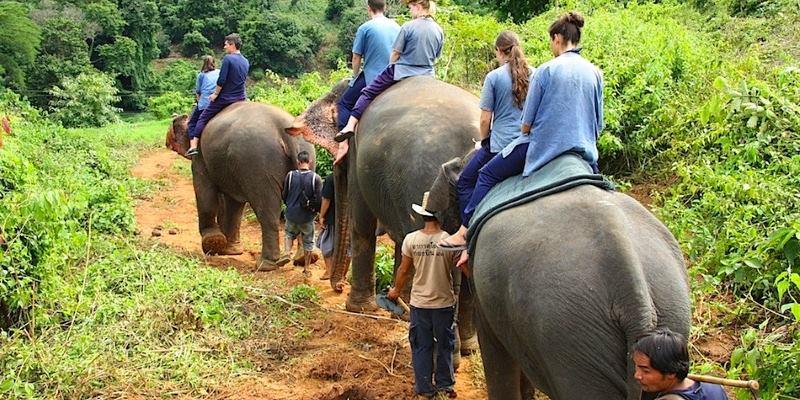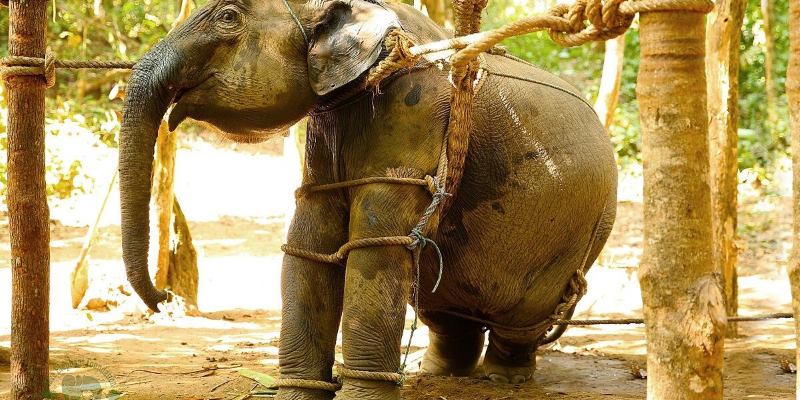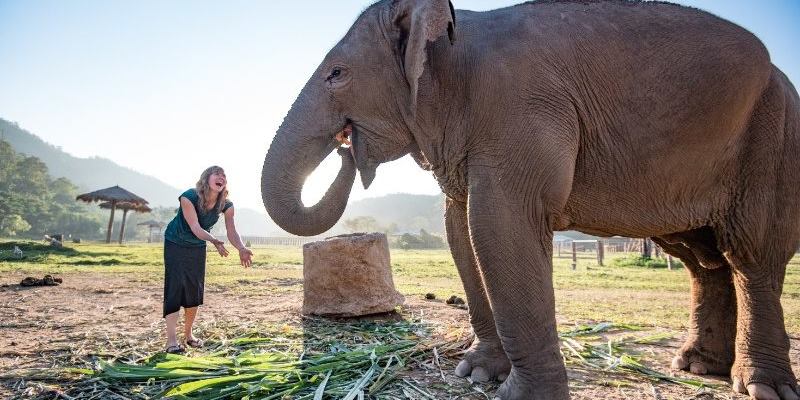Are you also deciding to go to Thailand on a trip to ride elephants through the dense jungles and shiny beaches?Before you embark on an elephant ride, it's crucial to understand the reality of what you're supporting.While riding an elephant may evoke a romanticised image, whether it's a stroll along a pristine beach or navigating through lush jungle streams, the reality is far from idyllic.
Riding elephants is discouraged, with organisations like the Humane Society of the US and the Association of Zoos and Aquariums opposing it due to the inherent abuse during the animals' training and the safety risks involved.
The awareness of this detrimental practice was heightened in 2014 by a World Animal Protection initiative, shedding light on the harsh conditions in which elephants are kept.
Liz Manning, the Responsible Business Manager at Intrepid Group, emphasises that the welfare standards in most Southeast Asian elephant venues assessed were notably poor.
Over the last five years, media coverage has amplified the issue, leading an increasing number of travel companies to eliminate such experiences from their trips, thereby raising awareness among their customers.Keep Reading to know more: The Heartbreaking Truth About Elephants in Thailand.
People Are Still Riding Elephants
Many individuals continue to ride elephants primarily due to a lack of awareness. If more people were exposed to videos depicting elephants being mistreated with bullhooks or electric prods, their enthusiasm for riding these majestic creatures would likely diminish.

Beyond the issue of abuse, there are several compelling reasons why people should forego elephant rides and choose more humane ways to interact with these animals.
Reasons Why You Should Avoid Elephant Ride?
Here are the reasons why you should avoid riding elephants on your trips.
Elephant Training

Elephant crushing is an old tradition in Thai culture and is a dangerous training method for elephants entering the tourism industry. Separated from their mothers, young elephants endure labour, physical abuse with bullhooks and bamboo sticks embedded with nails, starvation, and sleep deprivation. These methods aim to break their spirits and induce submission to humans.
While widely accepted in Thailand, this horrifying process is not the only reason to abstain from elephant riding.
Health Of The Elephant
The spinal structure of elephants is ill-suited to bear the sustained weight of humans, often resulting in permanent spinal injuries when subjected to continuous riding. Attaching a chair (howdah) to their backs further increases the issue, as this bulky chair rubs against their skin, leading to blisters that may become infected.
Additionally, prolonged trekking takes a toll on the elephants' feet, causing wear and tear that can result in foot infections and injuries.
Social Engagement
Elephants are like humans, from socialising and forming familial bonds to experiencing emotions like pain, sorrow, and happiness. However, when found in trekking camps, these majestic creatures often lack opportunities for social interaction with their own kind of animals.
Moreover, In certain camps, they endure a life that essentially amounts to solitary confinement, devoid of the companionship and social dynamics vital to their well-being.
Living Conditions of Elephant
During treks, baby elephants are tied to their mothers, subjecting them to potential harm as they are compelled to maintain a constant pace. These young elephants are unable to rest or nurse in their own care, as they must continually trek. Guides, known as mahouts, use bullhooks to stab the elephants and ensure they keep moving. The bullhook, a tool tied to their past torture during the crush, induces immediate fear in the elephants, leading to reactions that can pose risks not only to the elephants but also to the riders.
Post-trek, the elephants remain chained when not working, often lacking sufficient food and water. Numerous travellers have observed elephants exhibiting signs of head-bobbing, including swaying, pacing, and, severe psychological distress at trekking camps.
Asian Elephants are Endangered
As elephants are forcibly removed from their natural habitats and separated from their families, the high number in the wild becomes evident. This decline in population directly correlates with diminished breeding opportunities, resulting in a noticeable decrease in the Asian elephant population.
Participation in elephant riding in Thailand serves as a direct contributor to this alarming trend. These magnificent creatures deserve better treatment than what they currently endure.
Don’t Hear Others
If any tour operator promotes activities other than genuine elephant interaction then refuse him. If an establishment, labelled as a wildlife park or Elephant stunts show, provides services like, painting shows, elephant riding or circuses, it's a clear indication that the elephants have endured severe abuse in their training.
Even if some places assert their humane practices and deny the use of bullhooks, the very act of employing elephants for trekking implies harm and mistreatment, underscoring the importance of avoiding such venues.
Alternatives
In 2021, many of our travellers to Thailand are expected to explore ChiangChill, a venue that has transitioned from providing direct interaction with elephants to a new model. Now, visitors have the opportunity to observe these majestic creatures from a safe distance, witnessing their natural behaviours such as grazing and socialising.

For those seeking ethical elephant encounters, The Boon Lott’s Elephant Sanctuary and Elephant Nature Park in Northern Thailand are known as reputable destinations. These sanctuaries prioritise the well-being and safety of the elephants, ensuring that human-elephant interactions align with ethical and humane practices.
Conclusion
In the realm of travel, our choices have the power to shape the well-being of the world around us. The heartbreaking truth about elephant riding in Thailand unfolds a narrative of abuse, exploitation, and the silent suffering of these magnificent creatures.
As responsible travellers, we must heed the call to reject activities that compromise the dignity and safety of elephants. Opting for ethical alternatives, such as sanctuaries prioritising their well-being, allows us to witness the beauty of these creatures in a way that aligns with compassion and respect.
Let our journeys be a force for positive change, advocating for a world where the majestic grace of elephants is preserved, and their welfare comes before momentary experiences.
Now Pack your bag and visit Thailand with your friends and family but be sure to throw a lifeline to the voiceless.

Juliana Daniel Oct 21, 2023
Udaipur Photography Tour: Capturing City of Lakes

Sean William Jan 13, 2024
Traveling To Aruba

Sean William Mar 02, 2024
Mind-Blowing Water Sports In Bali For The Thrill Seeker In You

Sean William Dec 08, 2023
2 Nights 3 Days Stay In Goa | Itinerary, Amenities, And More

Juliana Daniel Sep 23, 2024
Unique Western Experiences in Montana

Sean William Dec 20, 2023
A Comprehensive Guide on Adinath Temple, Khajuraho

Sean William Jul 15, 2024
Top 7 Attractions in Bandung, Indonesia for an Unforgettable Trip

Juliana Daniel Dec 14, 2023